
Euphorbia lactea f. cristata variegata (coloured clones) Photo by: Valentino Vallicelli
Origin and Habitat: Garden origin (Nursery produced cultivar)
Synonyms:
See all synonyms of Euphorbia lactea
Description: Euphorbia lactea f. cristata or Elkhorn is a crested form with intricately undulating fan-shaped branches forming a snaky ridge or crowded cluster. The more common crested form is dark green attractively marked with silver-gray zig-zag patterns. But now this plant is available in a large number of picturesque variegated cultivars ranging in colour from white to, yellow, pink, violet and green. White Ghost is the cultivar name given to the white variegated form of Euphorbia lactea.
There exist also the standard species, not crested, with flattened, three sided stems that look like a candelabra who reach without problem a height of 5/6 meter.
Subspecies, varieties, forms and cultivars of plants belonging to the Euphorbia lactea group
Notes: Root stock of Euphorbia neriifolia is widely used to propagate specimens of crested, fan-shaped or colour mutants of Euphorbia lactea.
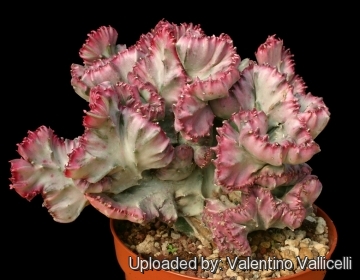 Euphorbia lactea f. cristata variegata (coloured clones) Photo by: Valentino Vallicelli
Euphorbia lactea f. cristata variegata (coloured clones) Photo by: Valentino Vallicelli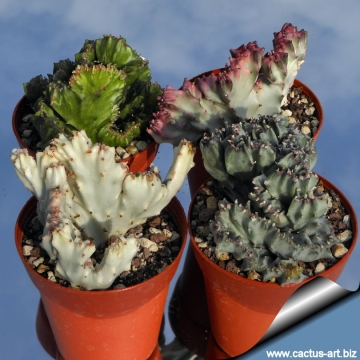 Euphorbia lactea f. cristata variegata (coloured clones) Photo by: Cactus Art
Euphorbia lactea f. cristata variegata (coloured clones) Photo by: Cactus Art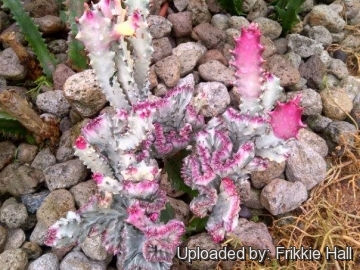 Euphorbia lactea f. cristata variegata (coloured clones) Photo by: Frikkie Hall
Euphorbia lactea f. cristata variegata (coloured clones) Photo by: Frikkie Hall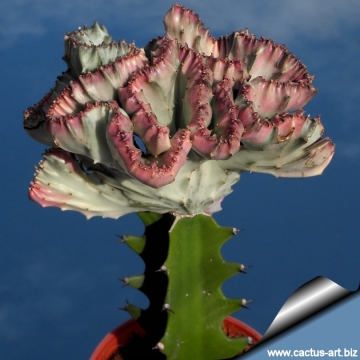 Euphorbia lactea f. cristata variegata (coloured clones) Photo by: Cactus Art
Euphorbia lactea f. cristata variegata (coloured clones) Photo by: Cactus Art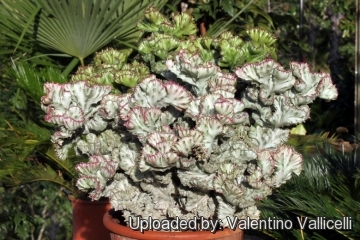 Euphorbia lactea f. cristata variegata (coloured clones) Photo by: Valentino Vallicelli
Euphorbia lactea f. cristata variegata (coloured clones) Photo by: Valentino Vallicelli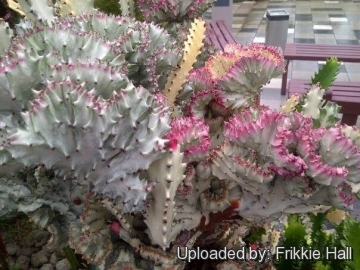 Euphorbia lactea f. cristata variegata (coloured clones) Photo by: Frikkie Hall
Euphorbia lactea f. cristata variegata (coloured clones) Photo by: Frikkie Hall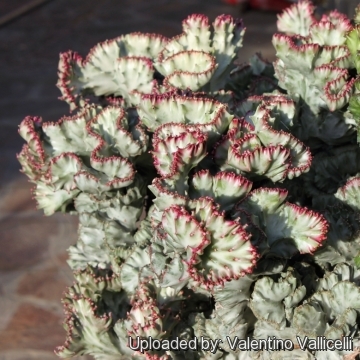 Euphorbia lactea f. cristata variegata (coloured clones) Photo by: Valentino Vallicelli
Euphorbia lactea f. cristata variegata (coloured clones) Photo by: Valentino Vallicelli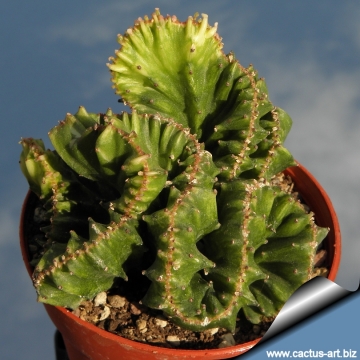 Euphorbia lactea f. cristata variegata (coloured clones) Photo by: Cactus Art
Euphorbia lactea f. cristata variegata (coloured clones) Photo by: Cactus ArtCultivation and Propagation: Cultivation: Euphorbia lactea "Cristata" need bright light to partial shade for best appearance (but the variegated forms do best if protected from strong sunshine in the hottest hours of the day). It responds well to warmth, with its active growth period in the late spring and summer months. Water thoroughly when soil is dry to the touch during active growing season (more than once a week during hot weather) In the winter months, waterigs should be suspended or restricted to once over the winter. The most common failure in growing this plant is over watering, especially during the winter months. Likes porous soil with adequate drainage.
Propagation: The green form of Euphorbia resiniferaSN|16003]] "Cristata" is propagated by cuttings or graft, while the variegated forms are difficult to grow on their own roots, and are generally grafted for convenience on Euphorbia canariensisSN|15754]]SN|15754]] or Euphorbia resiniferaSN|16003]].
It is recommend taking Euphorbia cuttings in Spring/Summer when the plant is growing so that they have a better chance of success. They key is heat & good air circulation. These cuttings should be dipped in Hormone powder (but it is not needed) and left for a period of 3-4 weeks to callous. Then pot the cutting and don't water ( or kept slightly moist) until rooted. These will root just fine, if you can put the pot outside in the summer, or put pot on a heating pad.
Crested growth: Unlike 'monstrose' varieties of plants, where the variation from normal growth is due to genetic mutation, crested growth can occur on normal plants. Sometimes it's due to variances in light intensity, or damage, but generally the causes are unknown. A crested plant may have some areas growing normally, and a cresting plant that looks like a brain, may revert to normal growth for no apparent reason. If you have any of the crested part left you need to remove the normal growth and leave the crested part behind this will need to be done regularly.
Warning: As with all other Euphorbias when a plant get damaged it exudes a thick white milky sap known as latex. This latex is poisonous and particularly dangerous for the eyes, skin and mucous membranes. So pay extreme attention not to get any in your eyes or mouth. Cultivated plants must be handled carefully.
Your Photos

by Cactus Art

by Cactus Art

by Valentino Vallicelli





















